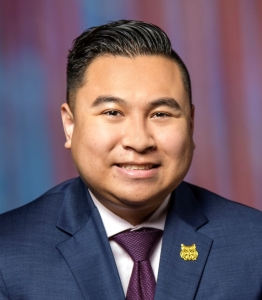On January 4, 2021, I received my first dose of the Pfizer SARS-CoV-2 vaccine. Signifying many different things to me. Personally, it represents safety in some measure. As an Arizona resident, it creates a sense that things are turning for the better, finally. And yet, as a future psychiatrist, clinician, and public health leader, it merely signifies the end of the beginning.
As I reflect on what has happened since this time last year, and the current situation present in the United States of America, it is evident that while the communities we live in can turn to the utilization of the vaccines cleared by the government as a sign of progress, there will be an incredibly long tail to this (hopefully) once in a lifetime pandemic. By no means do I seek to diminish the dogged efforts of researchers worldwide to characterize, understand, and ultimately mitigate the effects of the novel coronavirus. Their work is what has allowed the progress we have seen in the last few weeks.
Today, January 4, 2021, it has been reported that Arizona leads the entire country in newly reported cases of COVID. There have been considerable concerns about the effectiveness of the rollout of vaccines as well. And, as has been the case since the very start of this pandemic, there is the ever-present concern of the long-lasting medical effects of COVID on those afflicted with the virus in the past year. These have been documented in case studies, prospective studies, and news reports. The effects of this pandemic have been palpable for many of my classmates – many face uncertainty about the safety and health of their families, still, others are forced to consider the worst outcomes of this virus.
Our understanding of the physiological effects of the novel coronavirus has grown tremendously since research efforts were dedicated to understanding SARS-CoV-2. We now know which treatments do not work, the ideal methods of treating symptoms of the viral infection, and, unfortunately, how we must allocate care in situations where we fall into a scarcity of resources. As a worldwide healthcare system, and as a society, we will emerge from this pandemic in a position of relative security against one of the largest threats to humanity we have known in our lifetimes. And yet, the end is not in sight.
For many survivors, for many families of those who were lost in days past and days to come, and for many of those serving on the last line of defense (those serving in the hospitals dealing with COVID), the end is far away. While we are cultivating a deep understanding of how to treat the physiological impacts of this virus, we still have not even begun to face the immense, seemingly insurmountable task of addressing the mental health fallout of such a life-changing event. Schools have had a varied, patchwork approach to addressing education at the K-12 level nationally. Work has become a complicated and tense mix of working from home and coming in to serve on-site. Financial instability has been a major concern for countless Americans. And the ever-grinding psychological toll of caring for COVID patients is driving a deep gash into our providers’ minds.
I write this from a biased perspective, but still, I hope that this resonates. The mental health detriments that the pandemic has wrought on Americans, and humanity as a whole, have yet to be fully realized. And as we continue the rollout of the vaccines and expand our knowledge on the impacts of this virus, we must also turn an eye to the mental health of our communities, our circles, and perhaps most importantly, ourselves. This is not an admonition to simply “drink more water” or “get more sleep”. This is an impassioned plea to support one another. To share in the pain and to grow together. To help when and where we can, and to show what it truly means to be human. And last but certainly not least, be prepared to fight for better support in our communities for the fallout of this pandemic. In the coming months and years, people who had not faced mental health challenges prior to the emergence of COVID will be facing seemingly insurmountable and new pressures. We must be prepared to face the challenges of a new wave of mental health concerns earnestly and as prepared as we can. Fight for better change so that we may support those in greatest need. Just as those on the last line of defense have served to treat those with COVID, we must serve them with the respect and care they deserve. Depression, anxiety, and a whole host of other mental health conditions are coming down the pipe very soon, whether we’d like it to or not. It is up to us to stand up for one another and fight for what we deserve.
If we fail to prepare for the oncoming wave of mental health issues that will emerge from this pandemic, we face a weary end. One marked with painful and ultimately insignificant efforts to reverse the tide. One that sees the psychological crippling of an entire generation of Americans, and likely more worldwide. One that sees the full rooting of cynicism, doubt, and distrust in society. We don’t know how those of us around us will react or acclimate to the pandemic and its aftereffects. Many may choose to believe that there is no hope, trust, or way out. We must challenge that. And we must be able to face up to the truth of this pandemic. We must be able to validate each other’s pain and find ways to support one another. We must ensure a robust healthcare system that can deal with all of the strains of this year. Healthcare encompasses both physical and mental aspects, and this pandemic doesn’t go away when you close the article regarding the pandemic or shut off the TV when the news comes on. I hope that after you read this, you carry this message into your own lives. Stand for one another. Humanity is saved when we serve each other. Be patient, calm, kind, and understanding. And fight for better mental health, and better healthcare overall, for any and all.
“We must all hang together, or… we shall all hang separately.” – Benjamin Franklin, 1776
Jasper Puracan is a member of the Class of 2021, and graduated from the University of Arizona in 2016 with dual degrees -- B.S. in Molecular & Cellular Biology and B.S.B.A in Accounting. He is a MD/MPH dual degree student aspiring to become a psychiatrist. Alongside his future clinical practice, Jasper also seeks to expand his civic engagement and community leadership through advocacy and policy making. Outside of his work, Jasper spends time reading and testing out new recipes in the kitchen, which have gotten more and more elaborate over the years.


